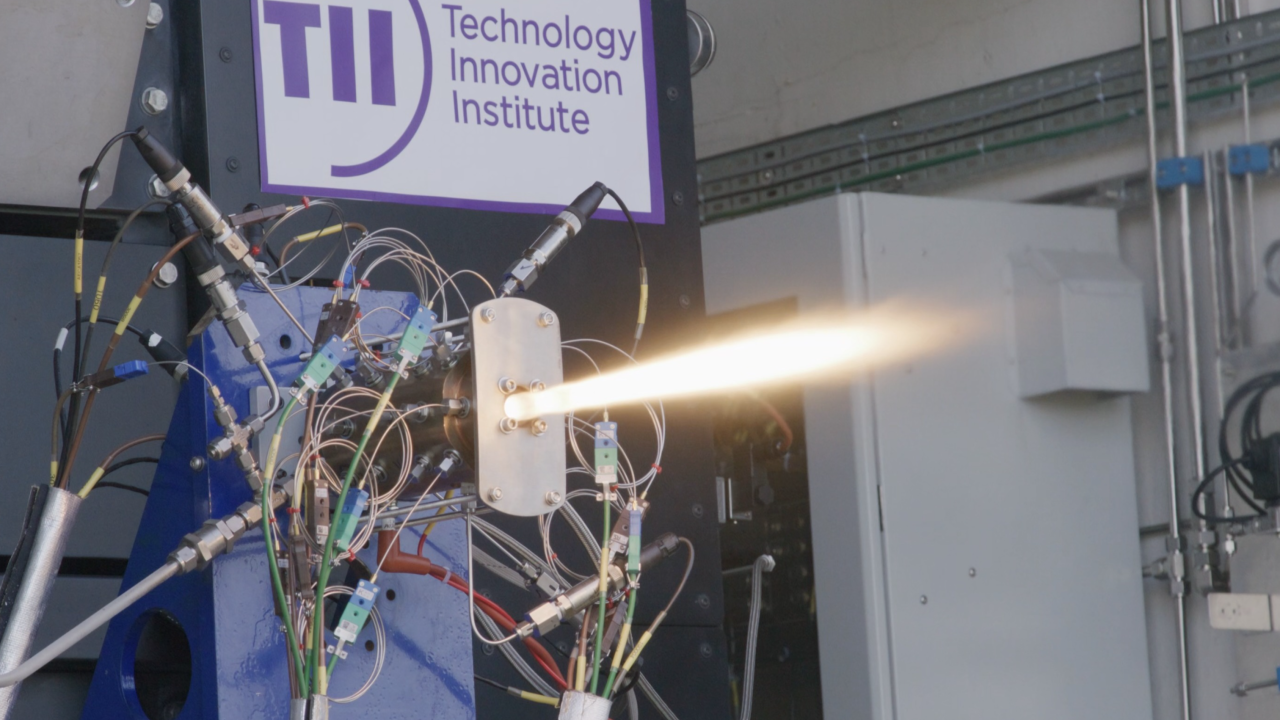The program showcases how local talent is helping shape the future of space propulsion
Earlier this year, the Technology Innovation Institute (TII) successfully test-fired the UAE’s first liquid rocket engine, validating performance in over 50 hot-fire tests. Behind this success was a collaborative team of researchers, including two female Emirati researchers whose contributions reflect both the strength of homegrown talent and the nation’s growing space ambitions.
This blog highlights their personal journeys and contributions, offering a closer look at the people behind the program’s success.
Shaima Albedwawi, a senior associate researcher, found her way into propulsion not through rockets, but through reactions, specifically, the intricate world of materials science and catalysis. As she delved deeper into how molecules interact and transform, she discovered a surprising connection to rocket science. Her PhD research, guided by an advisor working on space applications, revealed that the same principles driving chemical reactions could also drive spacecraft. That realization ignited a passion for propulsion, leading her to blend academic inquiry with hands-on innovation at TII.
“Over time, I realized that the fundamentals and foundations of catalysis are relevant to propulsion and more specifically monopropellant systems,” she says. “The theory and basics of catalysis directly inform how propellants will decompose safely in the monopropellant engines to produce thrust in small space applications.”
In the liquid rocket project, Albedwawi applied her expertise in chemical reactions at the molecular level to help the team understand how propellants behave in engines.
She played a central role in preparing and executing the test campaign, from designing test sequences and instrumenting the engine with sensors, to documenting results to guide the next phases of development.
She also captured the campaign on video, determined to showcase the effort and precision behind the success.
“We are establishing the legacy of liquid propulsion here in the region,” she says proudly. “This work is shaping the UAE’s path in space exploration and inspiring the next generation.”
While Albedwawi was instrumental in orchestrating the test campaign and interpreting its outcomes, her colleague Fatema Alawadhi was equally vital in shaping the engine’s readiness for those tests.
An associate researcher with a passion for propulsion, Alawadhi played a critical role in validating the engine’s reliability through advanced thermal and structural simulations. Her analysis predicted how the engine would respond under high pressure and heat, laying the foundation for a safe and efficient design. When the testing campaign began, she stepped beyond simulations to support engine assembly, an experience that deepened her appreciation for collaboration.
“Every time there is significant progress in flight, it comes from propulsion,” she says. “I wanted to be part of that story, especially at a time when the UAE is investing boldly, not just in space technologies, but in the young minds who will one day lead its missions."
Fatema experienced that investment firsthand as a student at Khalifa University, where she was inspired by how every leap in aviation, from the Wright brothers to Apollo, was powered by advances in propulsion.
“At university, I became interested in propulsion because I saw how important it is to atmospheric flight and space exploration,” she says. “Propulsion has always been the key for reaching higher speeds and altitudes and for exploring further.”
Both engineers describe the first successful ignition as a defining and unforgettable moment and the culmination of months of preparation.
“It showed me the power of collaboration,” Alawadhi says. “Every piece of work we had done, from design and simulation to assembly, came together at that moment.”
Alawadhi and Albedwawi emphasize that their journeys represent a contribution to the UAE’s long-term sovereignty in space and its ambition to lead from within.
They credited this progress to the UAE’s strong investment in nurturing young talent, through advanced research centers, graduate programs, and hands-on national projects that empower Emirati engineers to lead.
“The UAE is giving us the tools and the trust to shape the future,” says Alawadhi. “The work done today gives the next generation something to build on, so they can continue this journey and take it even further. It gives our work a deeper meaning.”
“My journey is a testament to how the UAE’s investment in research, education, and national talent development is empowering us to deliver groundbreaking advancements in space like the liquid rocket engine program,” adds Albedwawi.
Together, Albedwawi and Alawadhi represent the depth and diversity of young talent driving the UAE’s first liquid rocket engine. Their stories highlight the technical achievement as well as the human commitment and national vision behind it.
As the program moves toward larger engines and more ambitious missions, it’s this combination of skill, passion, and opportunity that will continue to propel the UAE forward.


